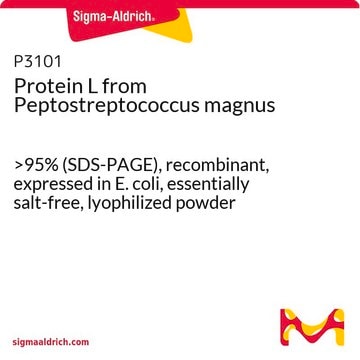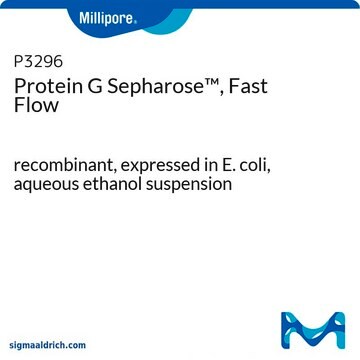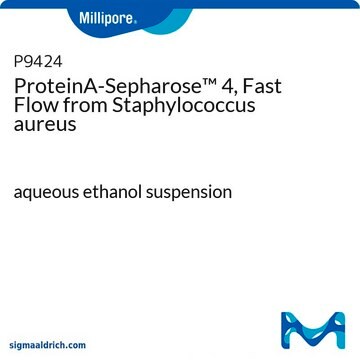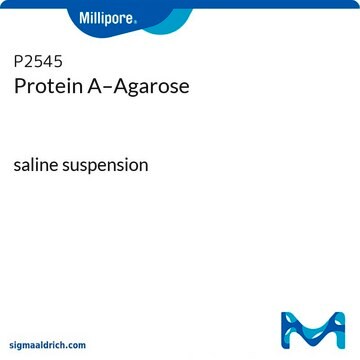P3351
Protein L–Agarose from Peptostreptococcus magnus
recombinant, expressed in E. coli
Sign Into View Organizational & Contract Pricing
All Photos(1)
About This Item
UNSPSC Code:
41106500
NACRES:
NA.56
Recommended Products
recombinant
expressed in E. coli
matrix
6% beaded agarose supplied as 50% slurry
matrix activation
cyanogen bromide
matrix attachment
amino
capacity
3-10 mg/mL binding capacity
storage temp.
2-8°C
Application
Protein L-agarose is used in affinity chromatography, protein chromatography, antibody purification and characterization, immunoaffinity matrices, phosphorylation analysis, and protein A, G and L resins. Protein L-agarose has been used to provide evidence that antineuronal antibodies may contribute to neuronal dysfunction observed in a subset of patients with neurogenic chronic intestinal pseudoobstruction. Protein L agarose has also been used to evaluate a diabody to improve protection againse a potent scorpion neurotoxin.
Protein L from Peptostreptococcus magnus binds immunoglobulins (Ig) primarily through kappa light chain interactions without interfering with the antigen binding site. Recombinant Protein L contains four Ig-binding domains.
Preparation Note
Prepared with recombinant Peptostreptococcus magnus Protein L.
Storage Class Code
3 - Flammable liquids
WGK
WGK 2
Flash Point(F)
Not applicable
Flash Point(C)
Not applicable
Certificates of Analysis (COA)
Search for Certificates of Analysis (COA) by entering the products Lot/Batch Number. Lot and Batch Numbers can be found on a product’s label following the words ‘Lot’ or ‘Batch’.
Already Own This Product?
Find documentation for the products that you have recently purchased in the Document Library.
Customers Also Viewed
Marion Avril et al.
Microbes and infection, 8(14-15), 2863-2871 (2006-11-11)
Pregnancy-associated malaria (PAM) is associated with the massive sequestration of erythrocytes infected with CSA-binding parasites in the placenta. Natural protective immunity against PAM is acquired during the course of pregnancies, with the development of anti-PfEMP1 antibodies recognizing placental infected erythrocytes
N Aubrey et al.
Cellular and molecular life sciences : CMLS, 60(3), 617-628 (2003-05-10)
Diabodies are recombinant, dimeric, antibody-based molecules composed of two non-covalently associated single-chain antibody fragments that bind to an antigen in a divalent manner. In an attempt to develop more effective therapeutic molecules against scorpion venoms, we designed a diabody derived
Isa Santos Duarte et al.
Artificial organs, 29(4), 313-323 (2005-03-25)
This work investigated the adsorption of autoantibodies such as anti-SS-A/Ro, anti-SS-B/La, anti-Sm, and anti-dsDNA on protein L-agarose gel. In order to determine better conditions for IgG adsorption on this matrix, some buffer systems were tested. Adsorption data were analyzed using
Annemarie Larkin et al.
Journal of immunological methods, 303(1-2), 53-65 (2005-07-26)
Monoclonal antibodies (MAbs) provide a powerful tool for the identification of novel tumour associated antigens. In an attempt to identify such an antigen, MAbs were generated by immunization with paraffin wax-embedded formalin-fixed invasive ductal breast tumour tissue from a patient
Roberto de Giorgio et al.
Gastroenterology, 135(2), 601-609 (2008-06-28)
Activation of autoimmune pathways has been implicated as a contributing mechanism to the pathophysiology in some patients with chronic intestinal pseudoobstruction (CIP). In this study we tested the hypothesis that sera from a subpopulation of patients with CIP contain autoantibodies
Our team of scientists has experience in all areas of research including Life Science, Material Science, Chemical Synthesis, Chromatography, Analytical and many others.
Contact Technical Service












